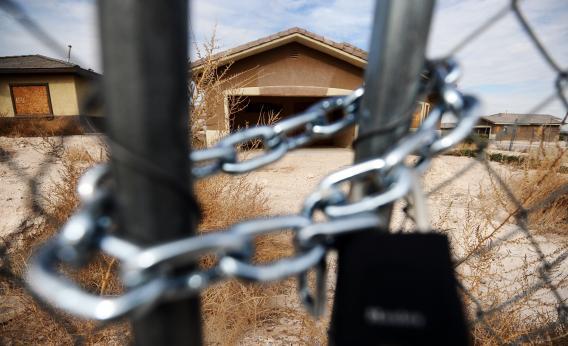Going broke can be a true state of emergency for American cities. It’s not a riot or flood, but it’s close enough to justify temporarily trimming workers’ pay, says one Nevada town. Though labor unions disagree, the argument is legally plausible and could save essential services. With more cities tumbling into insolvency, public officials need fresh ways to tighten belts.
It’s an increasingly common story. Tax receipts from the housing boom swelled North Las Vegas’ coffers, igniting lavish spending on recreation centers, pay raises and a new city hall. Along came the economic bust – and a $31 million budget deficit.
Police and firefighter unions blame public officials for squandering dollars. City bosses point to worker salaries that account for 80 percent of municipal expenditures. Either way, it’s a disaster that town officials claim qualifies under a law allowing the suspension of labor contracts during riots and other emergencies.
That’s not necessarily a stretch. The U.S. Constitution generally prohibits states and cities from breaking contracts, though courts have found exceptions when public welfare is threatened. That’s why Minnesota could stop mortgage foreclosures during the Great Depression. And in 1940, the Supreme Court said emergencies could include threats to the public’s “economic needs.”
The key is proving a contract breach is essentially a last resort. While New York, for instance, could defer pay increases in 1978 to avoid massive defaults, Hawaii couldn’t delay wages in 1999 when federal funds were available. In struggling Scranton, Pennsylvania, the mayor’s move to slash salaries on Friday probably won’t pass legal muster, because a tax hike could supply needed funds, if only the city council would agree to it.
But North Las Vegas seems out of options. Property tax revenue is down 37 percent since 2009, foreclosure rates are three times the national average and the jobless rate hit 14.3 percent in May. Privatizing services won’t raise enough money, and the city claims union negotiations are futile.
That leaves bankruptcy, a costly and difficult process. If pay cuts allow the city to avoid going bust while preserving public safety, they’re a sensible – and legally defensible – tack. A growing number of cash-strapped cities will be waiting to see whether the courts agree.
Read more at Reuters Breakingviews.
